Paradigm Wars: Analyzing Strategic Choice and Determinist Theories
VerifiedAdded on 2020/05/08
|13
|2972
|79
Essay
AI Summary
This assignment delves into the concept of paradigm wars within an organizational context, exploring how different approaches and theories impact achieving business objectives. It examines strategic choice and determinist theories, critically evaluating their roles in understanding organizational actions. The essay explores strategic choice, defining its steps and attributes, and contrasts it with determinist theories, including resource dependency, institutional, and population ecology theories. The study analyzes the strengths and weaknesses of each theory, arguing that determinist theories offer a more effective framework for addressing organizational challenges, particularly in managing resources and adapting to external environments. The conclusion emphasizes the importance of understanding both strategic and determinist approaches for effective organizational management and strategic planning.
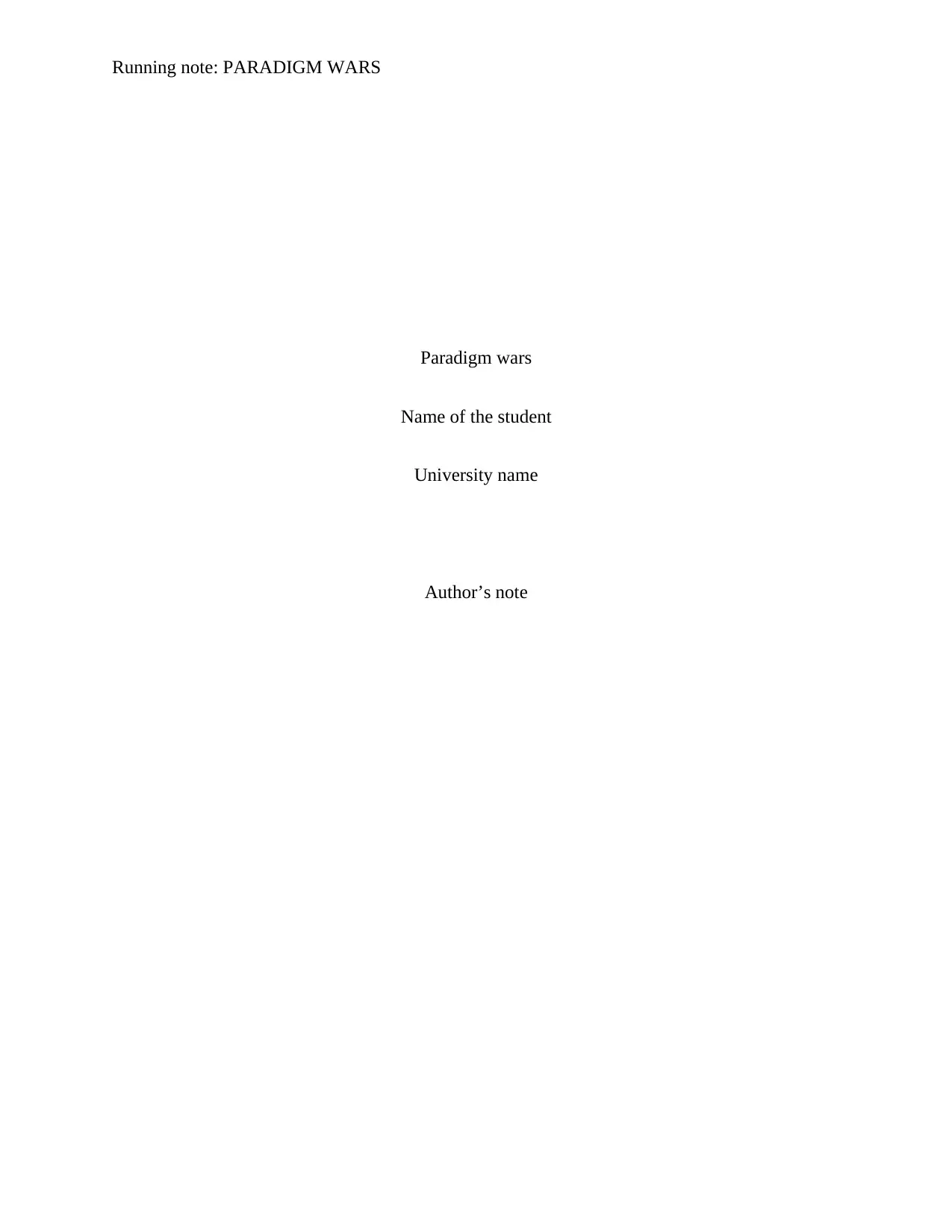
Running note: PARADIGM WARS
Paradigm wars
Name of the student
University name
Author’s note
Paradigm wars
Name of the student
University name
Author’s note
Paraphrase This Document
Need a fresh take? Get an instant paraphrase of this document with our AI Paraphraser
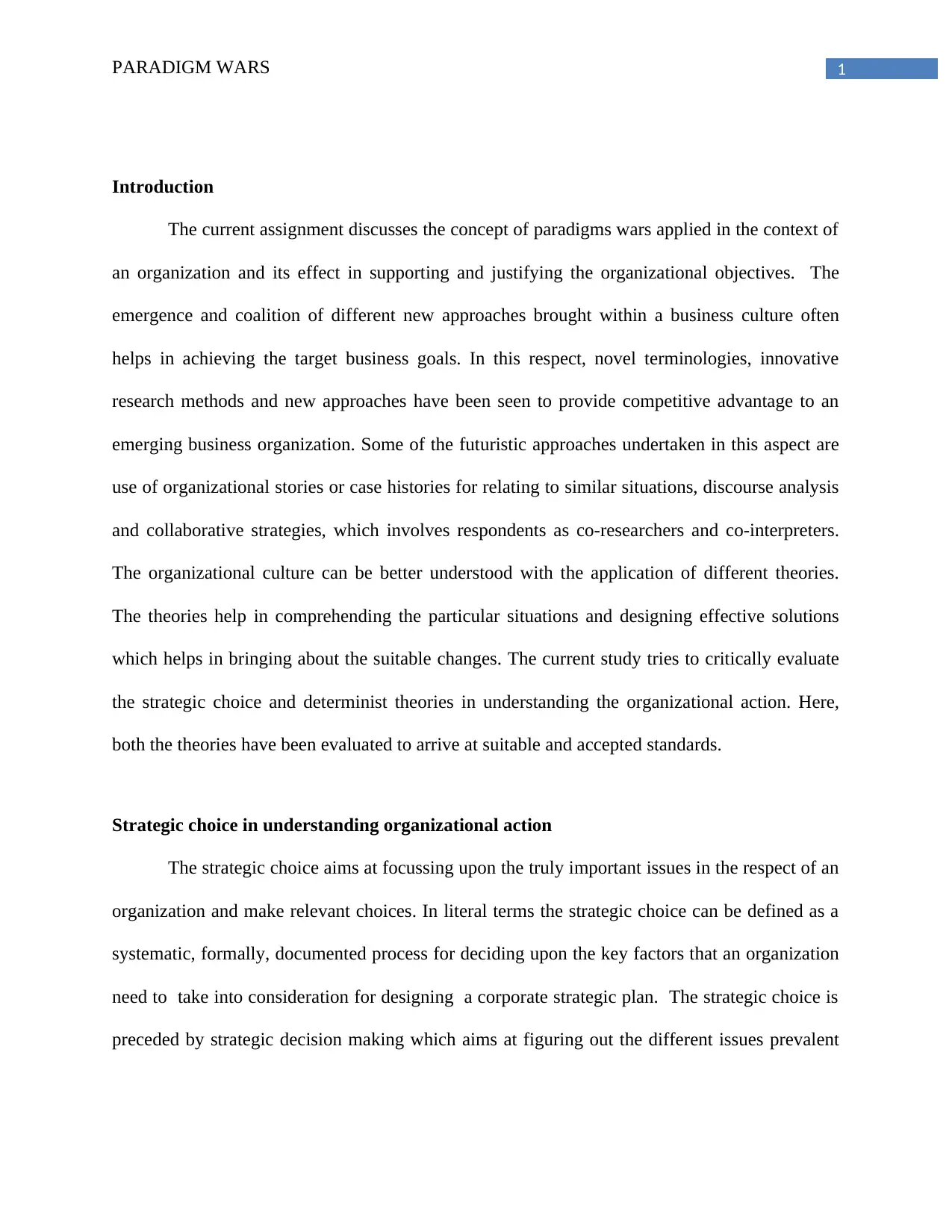
1PARADIGM WARS
Introduction
The current assignment discusses the concept of paradigms wars applied in the context of
an organization and its effect in supporting and justifying the organizational objectives. The
emergence and coalition of different new approaches brought within a business culture often
helps in achieving the target business goals. In this respect, novel terminologies, innovative
research methods and new approaches have been seen to provide competitive advantage to an
emerging business organization. Some of the futuristic approaches undertaken in this aspect are
use of organizational stories or case histories for relating to similar situations, discourse analysis
and collaborative strategies, which involves respondents as co-researchers and co-interpreters.
The organizational culture can be better understood with the application of different theories.
The theories help in comprehending the particular situations and designing effective solutions
which helps in bringing about the suitable changes. The current study tries to critically evaluate
the strategic choice and determinist theories in understanding the organizational action. Here,
both the theories have been evaluated to arrive at suitable and accepted standards.
Strategic choice in understanding organizational action
The strategic choice aims at focussing upon the truly important issues in the respect of an
organization and make relevant choices. In literal terms the strategic choice can be defined as a
systematic, formally, documented process for deciding upon the key factors that an organization
need to take into consideration for designing a corporate strategic plan. The strategic choice is
preceded by strategic decision making which aims at figuring out the different issues prevalent
Introduction
The current assignment discusses the concept of paradigms wars applied in the context of
an organization and its effect in supporting and justifying the organizational objectives. The
emergence and coalition of different new approaches brought within a business culture often
helps in achieving the target business goals. In this respect, novel terminologies, innovative
research methods and new approaches have been seen to provide competitive advantage to an
emerging business organization. Some of the futuristic approaches undertaken in this aspect are
use of organizational stories or case histories for relating to similar situations, discourse analysis
and collaborative strategies, which involves respondents as co-researchers and co-interpreters.
The organizational culture can be better understood with the application of different theories.
The theories help in comprehending the particular situations and designing effective solutions
which helps in bringing about the suitable changes. The current study tries to critically evaluate
the strategic choice and determinist theories in understanding the organizational action. Here,
both the theories have been evaluated to arrive at suitable and accepted standards.
Strategic choice in understanding organizational action
The strategic choice aims at focussing upon the truly important issues in the respect of an
organization and make relevant choices. In literal terms the strategic choice can be defined as a
systematic, formally, documented process for deciding upon the key factors that an organization
need to take into consideration for designing a corporate strategic plan. The strategic choice is
preceded by strategic decision making which aims at figuring out the different issues prevalent
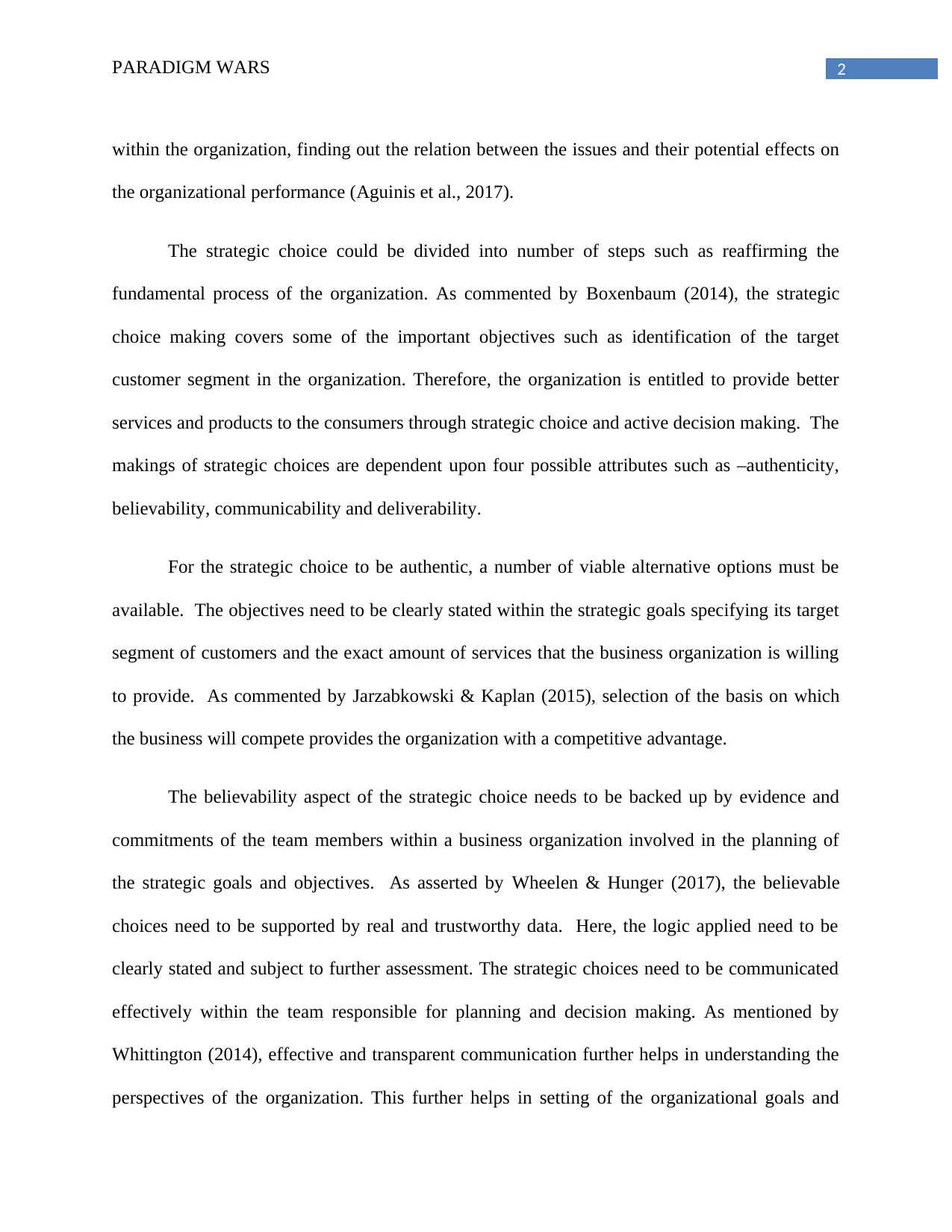
2PARADIGM WARS
within the organization, finding out the relation between the issues and their potential effects on
the organizational performance (Aguinis et al., 2017).
The strategic choice could be divided into number of steps such as reaffirming the
fundamental process of the organization. As commented by Boxenbaum (2014), the strategic
choice making covers some of the important objectives such as identification of the target
customer segment in the organization. Therefore, the organization is entitled to provide better
services and products to the consumers through strategic choice and active decision making. The
makings of strategic choices are dependent upon four possible attributes such as –authenticity,
believability, communicability and deliverability.
For the strategic choice to be authentic, a number of viable alternative options must be
available. The objectives need to be clearly stated within the strategic goals specifying its target
segment of customers and the exact amount of services that the business organization is willing
to provide. As commented by Jarzabkowski & Kaplan (2015), selection of the basis on which
the business will compete provides the organization with a competitive advantage.
The believability aspect of the strategic choice needs to be backed up by evidence and
commitments of the team members within a business organization involved in the planning of
the strategic goals and objectives. As asserted by Wheelen & Hunger (2017), the believable
choices need to be supported by real and trustworthy data. Here, the logic applied need to be
clearly stated and subject to further assessment. The strategic choices need to be communicated
effectively within the team responsible for planning and decision making. As mentioned by
Whittington (2014), effective and transparent communication further helps in understanding the
perspectives of the organization. This further helps in setting of the organizational goals and
within the organization, finding out the relation between the issues and their potential effects on
the organizational performance (Aguinis et al., 2017).
The strategic choice could be divided into number of steps such as reaffirming the
fundamental process of the organization. As commented by Boxenbaum (2014), the strategic
choice making covers some of the important objectives such as identification of the target
customer segment in the organization. Therefore, the organization is entitled to provide better
services and products to the consumers through strategic choice and active decision making. The
makings of strategic choices are dependent upon four possible attributes such as –authenticity,
believability, communicability and deliverability.
For the strategic choice to be authentic, a number of viable alternative options must be
available. The objectives need to be clearly stated within the strategic goals specifying its target
segment of customers and the exact amount of services that the business organization is willing
to provide. As commented by Jarzabkowski & Kaplan (2015), selection of the basis on which
the business will compete provides the organization with a competitive advantage.
The believability aspect of the strategic choice needs to be backed up by evidence and
commitments of the team members within a business organization involved in the planning of
the strategic goals and objectives. As asserted by Wheelen & Hunger (2017), the believable
choices need to be supported by real and trustworthy data. Here, the logic applied need to be
clearly stated and subject to further assessment. The strategic choices need to be communicated
effectively within the team responsible for planning and decision making. As mentioned by
Whittington (2014), effective and transparent communication further helps in understanding the
perspectives of the organization. This further helps in setting of the organizational goals and
⊘ This is a preview!⊘
Do you want full access?
Subscribe today to unlock all pages.

Trusted by 1+ million students worldwide
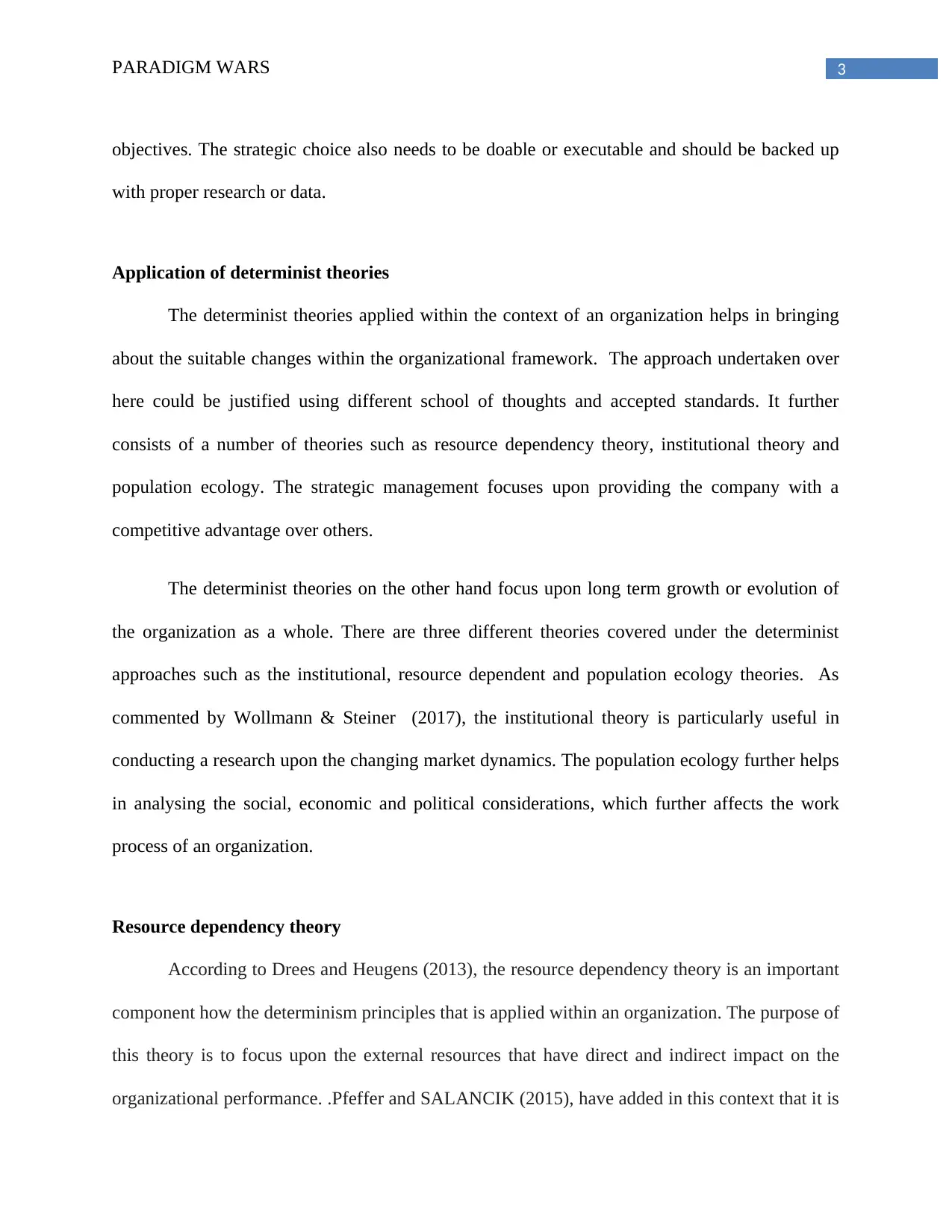
3PARADIGM WARS
objectives. The strategic choice also needs to be doable or executable and should be backed up
with proper research or data.
Application of determinist theories
The determinist theories applied within the context of an organization helps in bringing
about the suitable changes within the organizational framework. The approach undertaken over
here could be justified using different school of thoughts and accepted standards. It further
consists of a number of theories such as resource dependency theory, institutional theory and
population ecology. The strategic management focuses upon providing the company with a
competitive advantage over others.
The determinist theories on the other hand focus upon long term growth or evolution of
the organization as a whole. There are three different theories covered under the determinist
approaches such as the institutional, resource dependent and population ecology theories. As
commented by Wollmann & Steiner (2017), the institutional theory is particularly useful in
conducting a research upon the changing market dynamics. The population ecology further helps
in analysing the social, economic and political considerations, which further affects the work
process of an organization.
Resource dependency theory
According to Drees and Heugens (2013), the resource dependency theory is an important
component how the determinism principles that is applied within an organization. The purpose of
this theory is to focus upon the external resources that have direct and indirect impact on the
organizational performance. .Pfeffer and SALANCIK (2015), have added in this context that it is
objectives. The strategic choice also needs to be doable or executable and should be backed up
with proper research or data.
Application of determinist theories
The determinist theories applied within the context of an organization helps in bringing
about the suitable changes within the organizational framework. The approach undertaken over
here could be justified using different school of thoughts and accepted standards. It further
consists of a number of theories such as resource dependency theory, institutional theory and
population ecology. The strategic management focuses upon providing the company with a
competitive advantage over others.
The determinist theories on the other hand focus upon long term growth or evolution of
the organization as a whole. There are three different theories covered under the determinist
approaches such as the institutional, resource dependent and population ecology theories. As
commented by Wollmann & Steiner (2017), the institutional theory is particularly useful in
conducting a research upon the changing market dynamics. The population ecology further helps
in analysing the social, economic and political considerations, which further affects the work
process of an organization.
Resource dependency theory
According to Drees and Heugens (2013), the resource dependency theory is an important
component how the determinism principles that is applied within an organization. The purpose of
this theory is to focus upon the external resources that have direct and indirect impact on the
organizational performance. .Pfeffer and SALANCIK (2015), have added in this context that it is
Paraphrase This Document
Need a fresh take? Get an instant paraphrase of this document with our AI Paraphraser
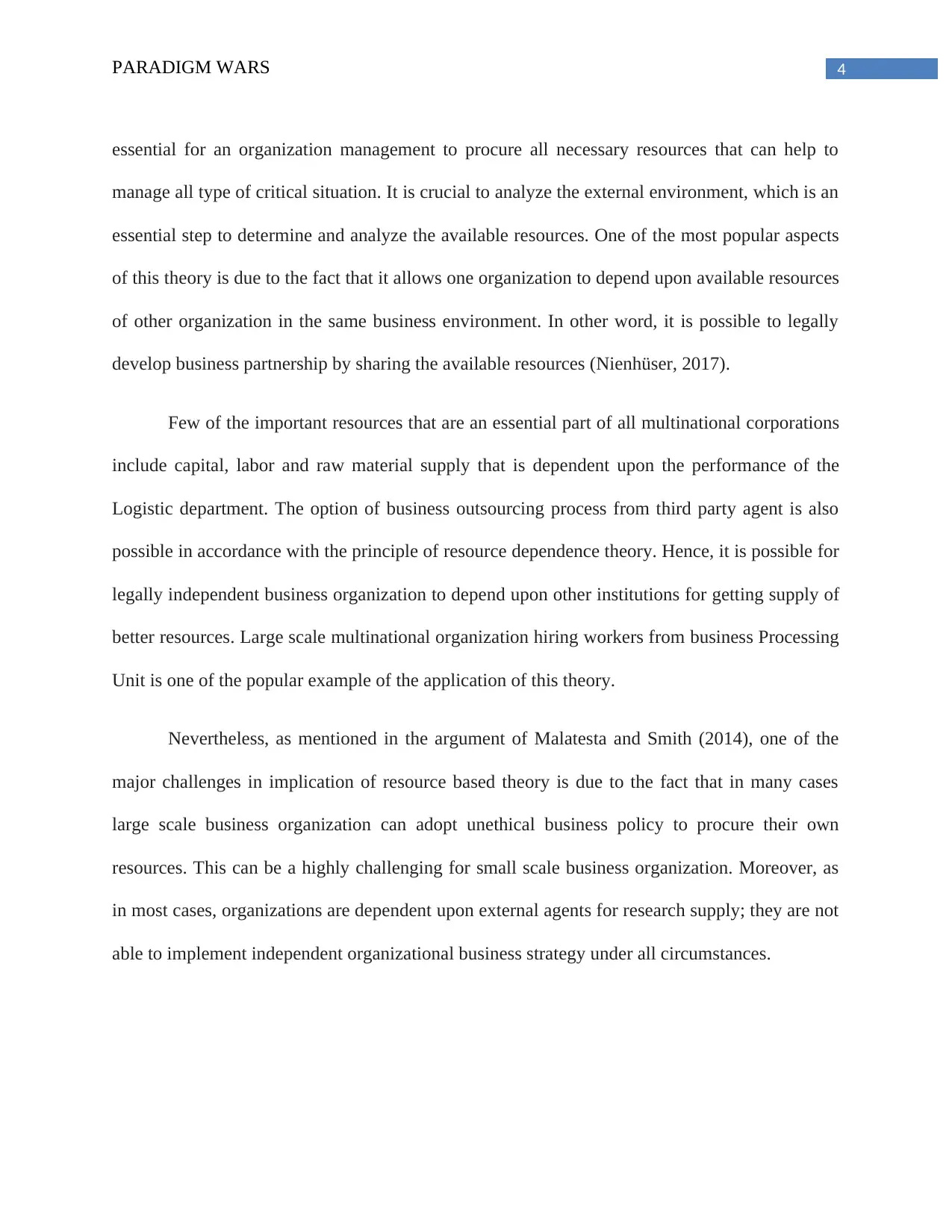
4PARADIGM WARS
essential for an organization management to procure all necessary resources that can help to
manage all type of critical situation. It is crucial to analyze the external environment, which is an
essential step to determine and analyze the available resources. One of the most popular aspects
of this theory is due to the fact that it allows one organization to depend upon available resources
of other organization in the same business environment. In other word, it is possible to legally
develop business partnership by sharing the available resources (Nienhüser, 2017).
Few of the important resources that are an essential part of all multinational corporations
include capital, labor and raw material supply that is dependent upon the performance of the
Logistic department. The option of business outsourcing process from third party agent is also
possible in accordance with the principle of resource dependence theory. Hence, it is possible for
legally independent business organization to depend upon other institutions for getting supply of
better resources. Large scale multinational organization hiring workers from business Processing
Unit is one of the popular example of the application of this theory.
Nevertheless, as mentioned in the argument of Malatesta and Smith (2014), one of the
major challenges in implication of resource based theory is due to the fact that in many cases
large scale business organization can adopt unethical business policy to procure their own
resources. This can be a highly challenging for small scale business organization. Moreover, as
in most cases, organizations are dependent upon external agents for research supply; they are not
able to implement independent organizational business strategy under all circumstances.
essential for an organization management to procure all necessary resources that can help to
manage all type of critical situation. It is crucial to analyze the external environment, which is an
essential step to determine and analyze the available resources. One of the most popular aspects
of this theory is due to the fact that it allows one organization to depend upon available resources
of other organization in the same business environment. In other word, it is possible to legally
develop business partnership by sharing the available resources (Nienhüser, 2017).
Few of the important resources that are an essential part of all multinational corporations
include capital, labor and raw material supply that is dependent upon the performance of the
Logistic department. The option of business outsourcing process from third party agent is also
possible in accordance with the principle of resource dependence theory. Hence, it is possible for
legally independent business organization to depend upon other institutions for getting supply of
better resources. Large scale multinational organization hiring workers from business Processing
Unit is one of the popular example of the application of this theory.
Nevertheless, as mentioned in the argument of Malatesta and Smith (2014), one of the
major challenges in implication of resource based theory is due to the fact that in many cases
large scale business organization can adopt unethical business policy to procure their own
resources. This can be a highly challenging for small scale business organization. Moreover, as
in most cases, organizations are dependent upon external agents for research supply; they are not
able to implement independent organizational business strategy under all circumstances.
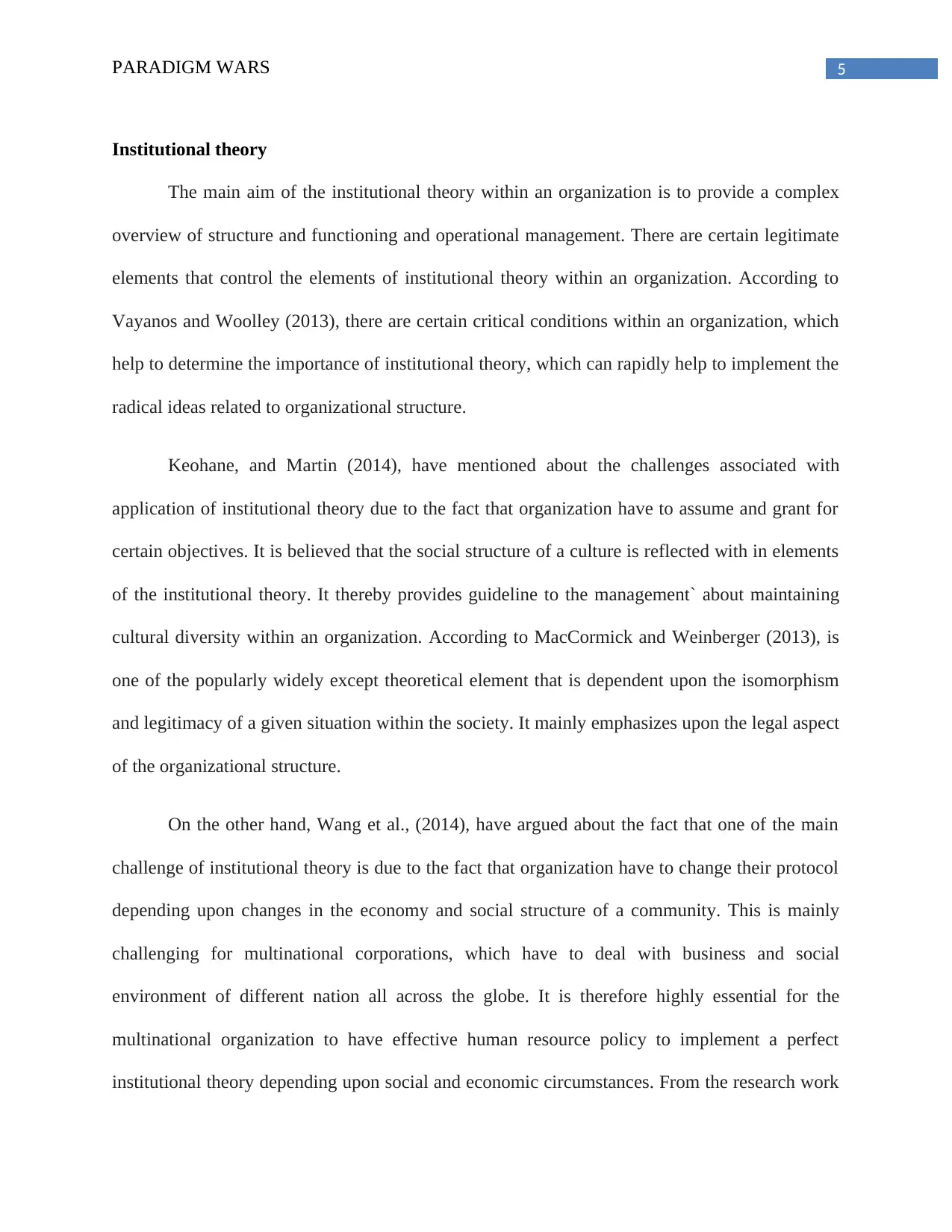
5PARADIGM WARS
Institutional theory
The main aim of the institutional theory within an organization is to provide a complex
overview of structure and functioning and operational management. There are certain legitimate
elements that control the elements of institutional theory within an organization. According to
Vayanos and Woolley (2013), there are certain critical conditions within an organization, which
help to determine the importance of institutional theory, which can rapidly help to implement the
radical ideas related to organizational structure.
Keohane, and Martin (2014), have mentioned about the challenges associated with
application of institutional theory due to the fact that organization have to assume and grant for
certain objectives. It is believed that the social structure of a culture is reflected with in elements
of the institutional theory. It thereby provides guideline to the management` about maintaining
cultural diversity within an organization. According to MacCormick and Weinberger (2013), is
one of the popularly widely except theoretical element that is dependent upon the isomorphism
and legitimacy of a given situation within the society. It mainly emphasizes upon the legal aspect
of the organizational structure.
On the other hand, Wang et al., (2014), have argued about the fact that one of the main
challenge of institutional theory is due to the fact that organization have to change their protocol
depending upon changes in the economy and social structure of a community. This is mainly
challenging for multinational corporations, which have to deal with business and social
environment of different nation all across the globe. It is therefore highly essential for the
multinational organization to have effective human resource policy to implement a perfect
institutional theory depending upon social and economic circumstances. From the research work
Institutional theory
The main aim of the institutional theory within an organization is to provide a complex
overview of structure and functioning and operational management. There are certain legitimate
elements that control the elements of institutional theory within an organization. According to
Vayanos and Woolley (2013), there are certain critical conditions within an organization, which
help to determine the importance of institutional theory, which can rapidly help to implement the
radical ideas related to organizational structure.
Keohane, and Martin (2014), have mentioned about the challenges associated with
application of institutional theory due to the fact that organization have to assume and grant for
certain objectives. It is believed that the social structure of a culture is reflected with in elements
of the institutional theory. It thereby provides guideline to the management` about maintaining
cultural diversity within an organization. According to MacCormick and Weinberger (2013), is
one of the popularly widely except theoretical element that is dependent upon the isomorphism
and legitimacy of a given situation within the society. It mainly emphasizes upon the legal aspect
of the organizational structure.
On the other hand, Wang et al., (2014), have argued about the fact that one of the main
challenge of institutional theory is due to the fact that organization have to change their protocol
depending upon changes in the economy and social structure of a community. This is mainly
challenging for multinational corporations, which have to deal with business and social
environment of different nation all across the globe. It is therefore highly essential for the
multinational organization to have effective human resource policy to implement a perfect
institutional theory depending upon social and economic circumstances. From the research work
⊘ This is a preview!⊘
Do you want full access?
Subscribe today to unlock all pages.

Trusted by 1+ million students worldwide
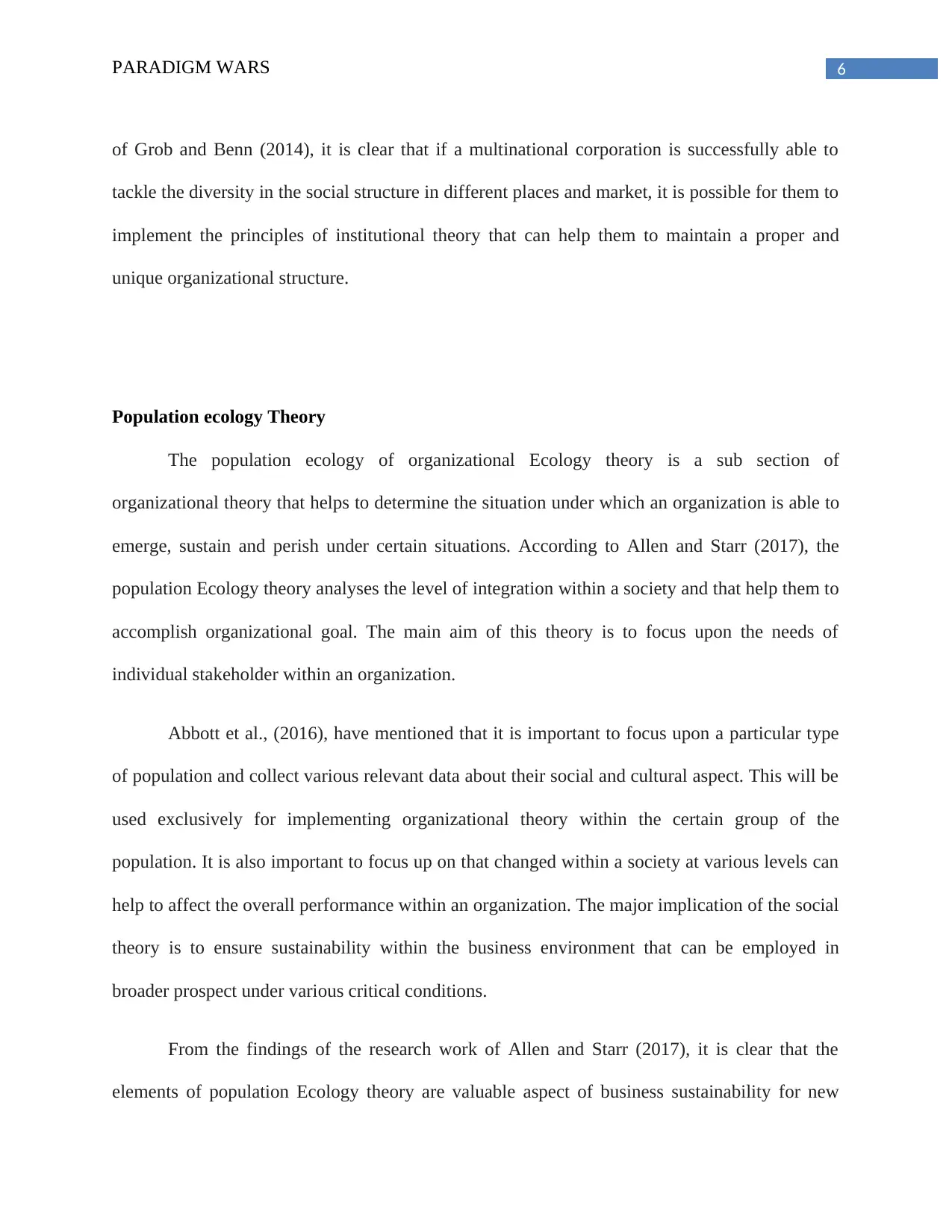
6PARADIGM WARS
of Grob and Benn (2014), it is clear that if a multinational corporation is successfully able to
tackle the diversity in the social structure in different places and market, it is possible for them to
implement the principles of institutional theory that can help them to maintain a proper and
unique organizational structure.
Population ecology Theory
The population ecology of organizational Ecology theory is a sub section of
organizational theory that helps to determine the situation under which an organization is able to
emerge, sustain and perish under certain situations. According to Allen and Starr (2017), the
population Ecology theory analyses the level of integration within a society and that help them to
accomplish organizational goal. The main aim of this theory is to focus upon the needs of
individual stakeholder within an organization.
Abbott et al., (2016), have mentioned that it is important to focus upon a particular type
of population and collect various relevant data about their social and cultural aspect. This will be
used exclusively for implementing organizational theory within the certain group of the
population. It is also important to focus up on that changed within a society at various levels can
help to affect the overall performance within an organization. The major implication of the social
theory is to ensure sustainability within the business environment that can be employed in
broader prospect under various critical conditions.
From the findings of the research work of Allen and Starr (2017), it is clear that the
elements of population Ecology theory are valuable aspect of business sustainability for new
of Grob and Benn (2014), it is clear that if a multinational corporation is successfully able to
tackle the diversity in the social structure in different places and market, it is possible for them to
implement the principles of institutional theory that can help them to maintain a proper and
unique organizational structure.
Population ecology Theory
The population ecology of organizational Ecology theory is a sub section of
organizational theory that helps to determine the situation under which an organization is able to
emerge, sustain and perish under certain situations. According to Allen and Starr (2017), the
population Ecology theory analyses the level of integration within a society and that help them to
accomplish organizational goal. The main aim of this theory is to focus upon the needs of
individual stakeholder within an organization.
Abbott et al., (2016), have mentioned that it is important to focus upon a particular type
of population and collect various relevant data about their social and cultural aspect. This will be
used exclusively for implementing organizational theory within the certain group of the
population. It is also important to focus up on that changed within a society at various levels can
help to affect the overall performance within an organization. The major implication of the social
theory is to ensure sustainability within the business environment that can be employed in
broader prospect under various critical conditions.
From the findings of the research work of Allen and Starr (2017), it is clear that the
elements of population Ecology theory are valuable aspect of business sustainability for new
Paraphrase This Document
Need a fresh take? Get an instant paraphrase of this document with our AI Paraphraser
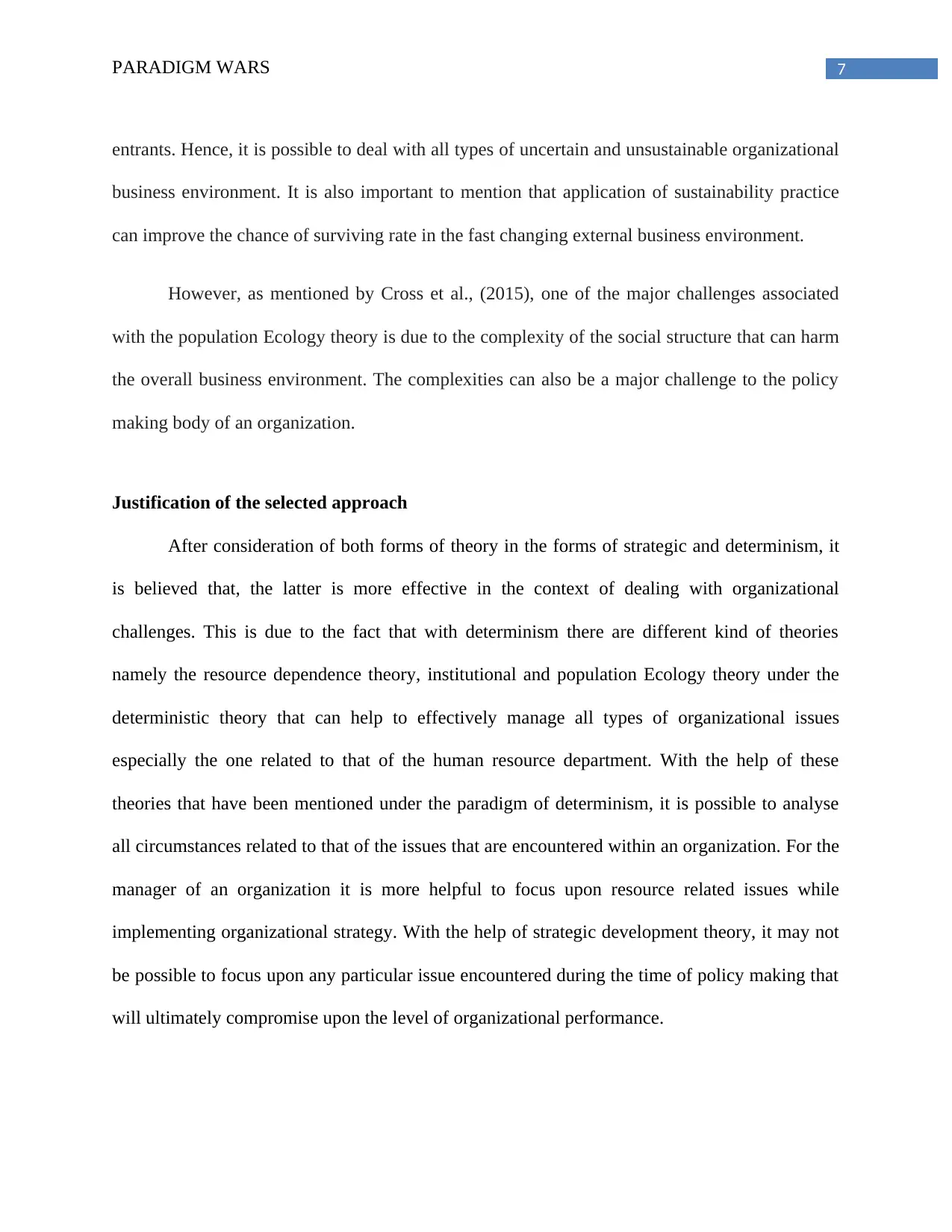
7PARADIGM WARS
entrants. Hence, it is possible to deal with all types of uncertain and unsustainable organizational
business environment. It is also important to mention that application of sustainability practice
can improve the chance of surviving rate in the fast changing external business environment.
However, as mentioned by Cross et al., (2015), one of the major challenges associated
with the population Ecology theory is due to the complexity of the social structure that can harm
the overall business environment. The complexities can also be a major challenge to the policy
making body of an organization.
Justification of the selected approach
After consideration of both forms of theory in the forms of strategic and determinism, it
is believed that, the latter is more effective in the context of dealing with organizational
challenges. This is due to the fact that with determinism there are different kind of theories
namely the resource dependence theory, institutional and population Ecology theory under the
deterministic theory that can help to effectively manage all types of organizational issues
especially the one related to that of the human resource department. With the help of these
theories that have been mentioned under the paradigm of determinism, it is possible to analyse
all circumstances related to that of the issues that are encountered within an organization. For the
manager of an organization it is more helpful to focus upon resource related issues while
implementing organizational strategy. With the help of strategic development theory, it may not
be possible to focus upon any particular issue encountered during the time of policy making that
will ultimately compromise upon the level of organizational performance.
entrants. Hence, it is possible to deal with all types of uncertain and unsustainable organizational
business environment. It is also important to mention that application of sustainability practice
can improve the chance of surviving rate in the fast changing external business environment.
However, as mentioned by Cross et al., (2015), one of the major challenges associated
with the population Ecology theory is due to the complexity of the social structure that can harm
the overall business environment. The complexities can also be a major challenge to the policy
making body of an organization.
Justification of the selected approach
After consideration of both forms of theory in the forms of strategic and determinism, it
is believed that, the latter is more effective in the context of dealing with organizational
challenges. This is due to the fact that with determinism there are different kind of theories
namely the resource dependence theory, institutional and population Ecology theory under the
deterministic theory that can help to effectively manage all types of organizational issues
especially the one related to that of the human resource department. With the help of these
theories that have been mentioned under the paradigm of determinism, it is possible to analyse
all circumstances related to that of the issues that are encountered within an organization. For the
manager of an organization it is more helpful to focus upon resource related issues while
implementing organizational strategy. With the help of strategic development theory, it may not
be possible to focus upon any particular issue encountered during the time of policy making that
will ultimately compromise upon the level of organizational performance.
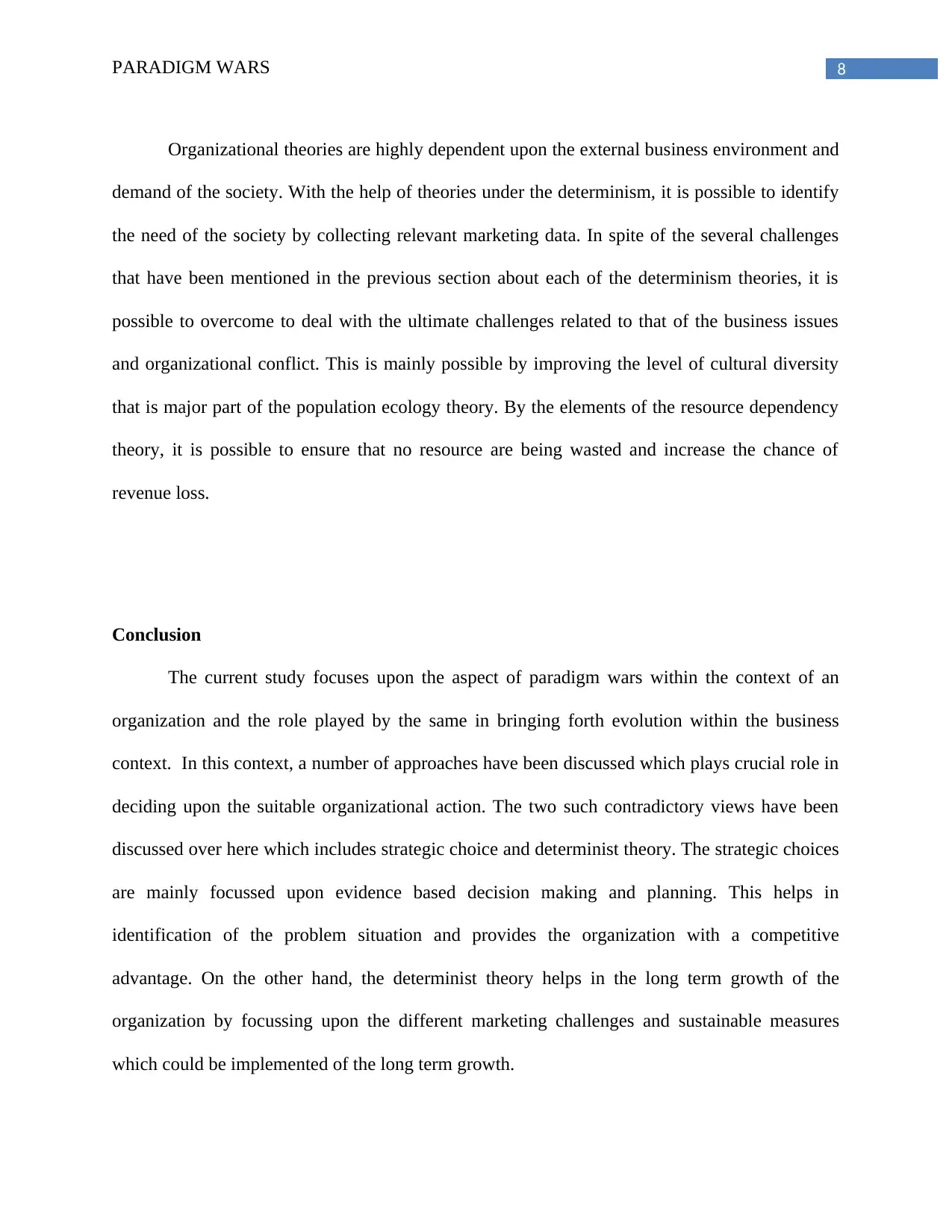
8PARADIGM WARS
Organizational theories are highly dependent upon the external business environment and
demand of the society. With the help of theories under the determinism, it is possible to identify
the need of the society by collecting relevant marketing data. In spite of the several challenges
that have been mentioned in the previous section about each of the determinism theories, it is
possible to overcome to deal with the ultimate challenges related to that of the business issues
and organizational conflict. This is mainly possible by improving the level of cultural diversity
that is major part of the population ecology theory. By the elements of the resource dependency
theory, it is possible to ensure that no resource are being wasted and increase the chance of
revenue loss.
Conclusion
The current study focuses upon the aspect of paradigm wars within the context of an
organization and the role played by the same in bringing forth evolution within the business
context. In this context, a number of approaches have been discussed which plays crucial role in
deciding upon the suitable organizational action. The two such contradictory views have been
discussed over here which includes strategic choice and determinist theory. The strategic choices
are mainly focussed upon evidence based decision making and planning. This helps in
identification of the problem situation and provides the organization with a competitive
advantage. On the other hand, the determinist theory helps in the long term growth of the
organization by focussing upon the different marketing challenges and sustainable measures
which could be implemented of the long term growth.
Organizational theories are highly dependent upon the external business environment and
demand of the society. With the help of theories under the determinism, it is possible to identify
the need of the society by collecting relevant marketing data. In spite of the several challenges
that have been mentioned in the previous section about each of the determinism theories, it is
possible to overcome to deal with the ultimate challenges related to that of the business issues
and organizational conflict. This is mainly possible by improving the level of cultural diversity
that is major part of the population ecology theory. By the elements of the resource dependency
theory, it is possible to ensure that no resource are being wasted and increase the chance of
revenue loss.
Conclusion
The current study focuses upon the aspect of paradigm wars within the context of an
organization and the role played by the same in bringing forth evolution within the business
context. In this context, a number of approaches have been discussed which plays crucial role in
deciding upon the suitable organizational action. The two such contradictory views have been
discussed over here which includes strategic choice and determinist theory. The strategic choices
are mainly focussed upon evidence based decision making and planning. This helps in
identification of the problem situation and provides the organization with a competitive
advantage. On the other hand, the determinist theory helps in the long term growth of the
organization by focussing upon the different marketing challenges and sustainable measures
which could be implemented of the long term growth.
⊘ This is a preview!⊘
Do you want full access?
Subscribe today to unlock all pages.

Trusted by 1+ million students worldwide
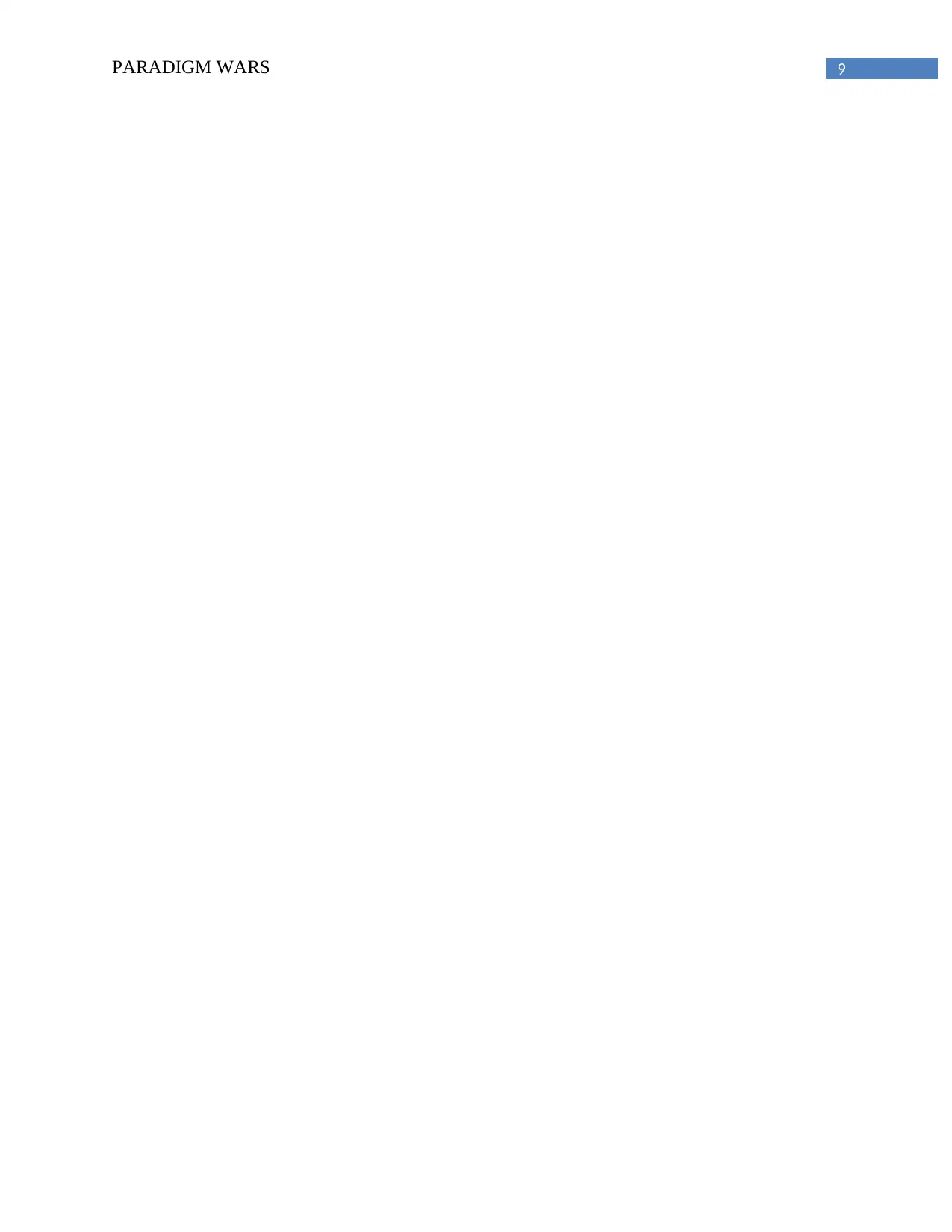
9PARADIGM WARS
Paraphrase This Document
Need a fresh take? Get an instant paraphrase of this document with our AI Paraphraser
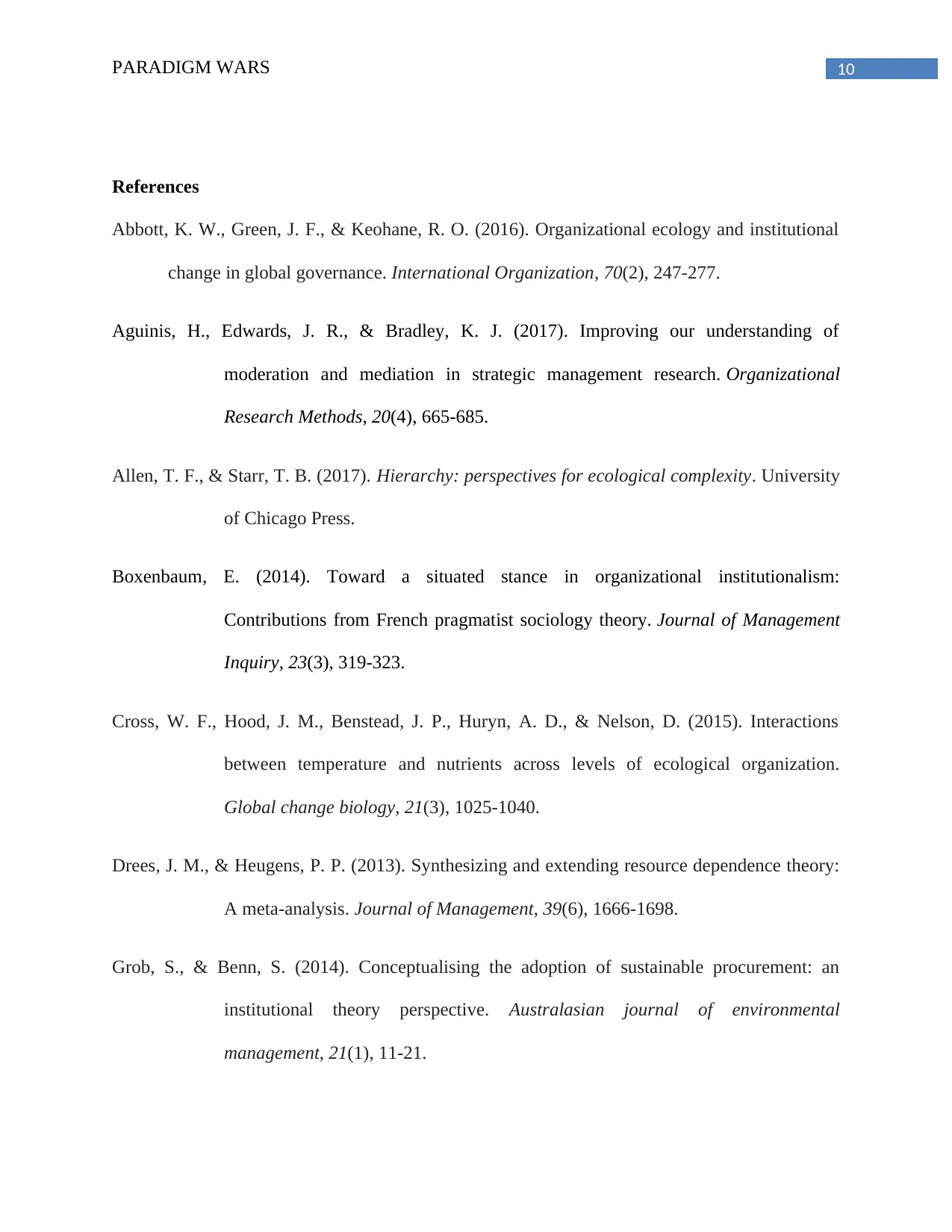
10PARADIGM WARS
References
Abbott, K. W., Green, J. F., & Keohane, R. O. (2016). Organizational ecology and institutional
change in global governance. International Organization, 70(2), 247-277.
Aguinis, H., Edwards, J. R., & Bradley, K. J. (2017). Improving our understanding of
moderation and mediation in strategic management research. Organizational
Research Methods, 20(4), 665-685.
Allen, T. F., & Starr, T. B. (2017). Hierarchy: perspectives for ecological complexity. University
of Chicago Press.
Boxenbaum, E. (2014). Toward a situated stance in organizational institutionalism:
Contributions from French pragmatist sociology theory. Journal of Management
Inquiry, 23(3), 319-323.
Cross, W. F., Hood, J. M., Benstead, J. P., Huryn, A. D., & Nelson, D. (2015). Interactions
between temperature and nutrients across levels of ecological organization.
Global change biology, 21(3), 1025-1040.
Drees, J. M., & Heugens, P. P. (2013). Synthesizing and extending resource dependence theory:
A meta-analysis. Journal of Management, 39(6), 1666-1698.
Grob, S., & Benn, S. (2014). Conceptualising the adoption of sustainable procurement: an
institutional theory perspective. Australasian journal of environmental
management, 21(1), 11-21.
References
Abbott, K. W., Green, J. F., & Keohane, R. O. (2016). Organizational ecology and institutional
change in global governance. International Organization, 70(2), 247-277.
Aguinis, H., Edwards, J. R., & Bradley, K. J. (2017). Improving our understanding of
moderation and mediation in strategic management research. Organizational
Research Methods, 20(4), 665-685.
Allen, T. F., & Starr, T. B. (2017). Hierarchy: perspectives for ecological complexity. University
of Chicago Press.
Boxenbaum, E. (2014). Toward a situated stance in organizational institutionalism:
Contributions from French pragmatist sociology theory. Journal of Management
Inquiry, 23(3), 319-323.
Cross, W. F., Hood, J. M., Benstead, J. P., Huryn, A. D., & Nelson, D. (2015). Interactions
between temperature and nutrients across levels of ecological organization.
Global change biology, 21(3), 1025-1040.
Drees, J. M., & Heugens, P. P. (2013). Synthesizing and extending resource dependence theory:
A meta-analysis. Journal of Management, 39(6), 1666-1698.
Grob, S., & Benn, S. (2014). Conceptualising the adoption of sustainable procurement: an
institutional theory perspective. Australasian journal of environmental
management, 21(1), 11-21.
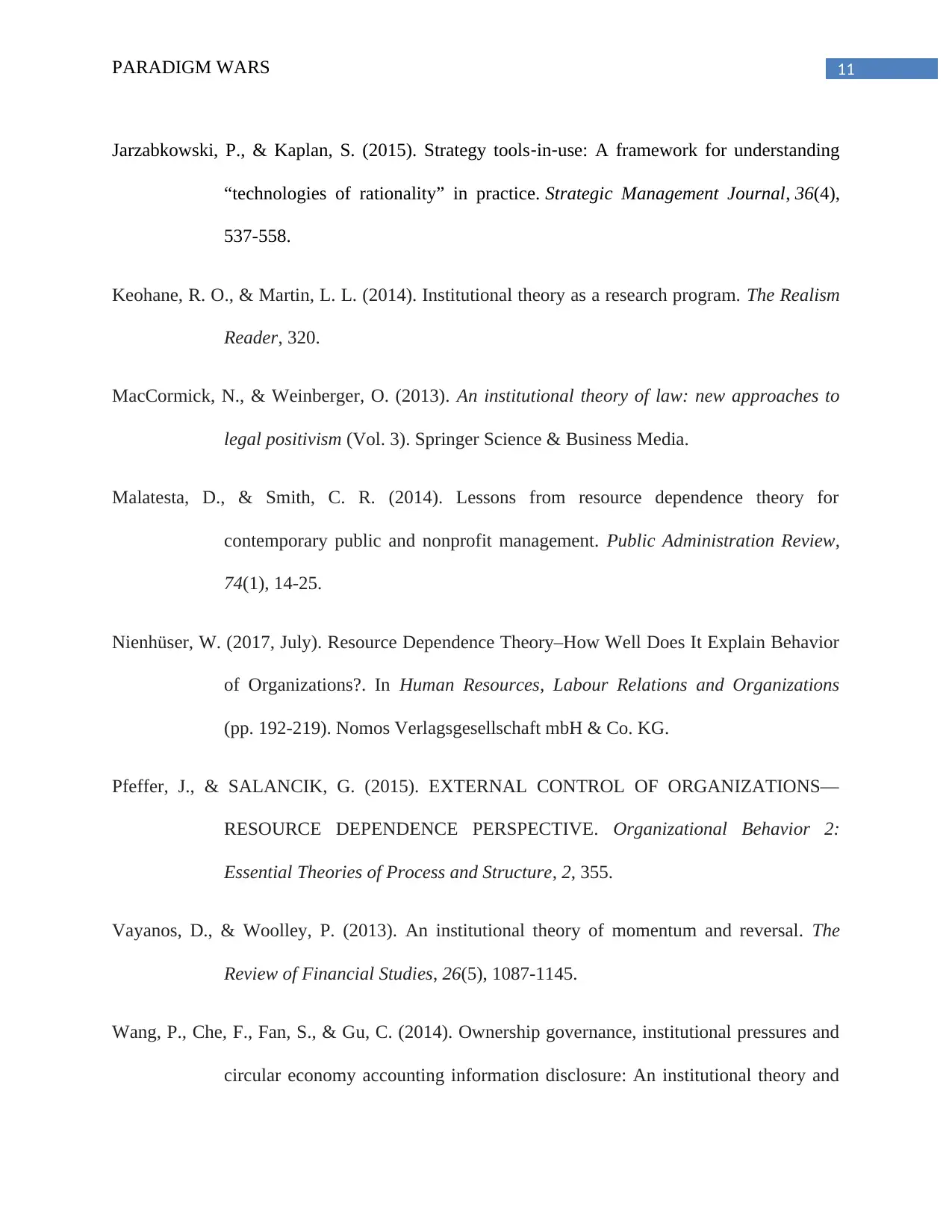
11PARADIGM WARS
Jarzabkowski, P., & Kaplan, S. (2015). Strategy tools‐in‐use: A framework for understanding
“technologies of rationality” in practice. Strategic Management Journal, 36(4),
537-558.
Keohane, R. O., & Martin, L. L. (2014). Institutional theory as a research program. The Realism
Reader, 320.
MacCormick, N., & Weinberger, O. (2013). An institutional theory of law: new approaches to
legal positivism (Vol. 3). Springer Science & Business Media.
Malatesta, D., & Smith, C. R. (2014). Lessons from resource dependence theory for
contemporary public and nonprofit management. Public Administration Review,
74(1), 14-25.
Nienhüser, W. (2017, July). Resource Dependence Theory–How Well Does It Explain Behavior
of Organizations?. In Human Resources, Labour Relations and Organizations
(pp. 192-219). Nomos Verlagsgesellschaft mbH & Co. KG.
Pfeffer, J., & SALANCIK, G. (2015). EXTERNAL CONTROL OF ORGANIZATIONS—
RESOURCE DEPENDENCE PERSPECTIVE. Organizational Behavior 2:
Essential Theories of Process and Structure, 2, 355.
Vayanos, D., & Woolley, P. (2013). An institutional theory of momentum and reversal. The
Review of Financial Studies, 26(5), 1087-1145.
Wang, P., Che, F., Fan, S., & Gu, C. (2014). Ownership governance, institutional pressures and
circular economy accounting information disclosure: An institutional theory and
Jarzabkowski, P., & Kaplan, S. (2015). Strategy tools‐in‐use: A framework for understanding
“technologies of rationality” in practice. Strategic Management Journal, 36(4),
537-558.
Keohane, R. O., & Martin, L. L. (2014). Institutional theory as a research program. The Realism
Reader, 320.
MacCormick, N., & Weinberger, O. (2013). An institutional theory of law: new approaches to
legal positivism (Vol. 3). Springer Science & Business Media.
Malatesta, D., & Smith, C. R. (2014). Lessons from resource dependence theory for
contemporary public and nonprofit management. Public Administration Review,
74(1), 14-25.
Nienhüser, W. (2017, July). Resource Dependence Theory–How Well Does It Explain Behavior
of Organizations?. In Human Resources, Labour Relations and Organizations
(pp. 192-219). Nomos Verlagsgesellschaft mbH & Co. KG.
Pfeffer, J., & SALANCIK, G. (2015). EXTERNAL CONTROL OF ORGANIZATIONS—
RESOURCE DEPENDENCE PERSPECTIVE. Organizational Behavior 2:
Essential Theories of Process and Structure, 2, 355.
Vayanos, D., & Woolley, P. (2013). An institutional theory of momentum and reversal. The
Review of Financial Studies, 26(5), 1087-1145.
Wang, P., Che, F., Fan, S., & Gu, C. (2014). Ownership governance, institutional pressures and
circular economy accounting information disclosure: An institutional theory and
⊘ This is a preview!⊘
Do you want full access?
Subscribe today to unlock all pages.

Trusted by 1+ million students worldwide
1 out of 13
Related Documents
Your All-in-One AI-Powered Toolkit for Academic Success.
+13062052269
info@desklib.com
Available 24*7 on WhatsApp / Email
![[object Object]](/_next/static/media/star-bottom.7253800d.svg)
Unlock your academic potential
Copyright © 2020–2026 A2Z Services. All Rights Reserved. Developed and managed by ZUCOL.




